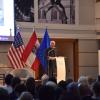
IIASA is coordinating CircEUlar, a new four-year project funded by Horizon Europe aiming to develop circular pathways for a low-carbon transition in the European Union.
Circularity involves changing our current economic, technical, and environmental systems in a way that eliminates waste and maximizes the reuse of resources. Building circularity through the adoption of sustainable consumption and production practices into the way we drive our economies, is a crucial step in delivering on almost every aspect of agreements like the Sustainable Development Goals and the Paris Agreement.
The goal of the CircEUlar Project is to understand the potential of circular economy strategies for reducing greenhouse gas emissions and achieving the EU’s net zero emissions target by 2050. The project will address circularity and related impacts on emissions from a systems perspective, taking into account different levers for change, such as dematerialization and the transition to a service-based economy to limit material stock growth, extending the lifetimes of products via repair, maintenance, and reuse, and reducing waste while increasing recycling.
“I am very much looking forward to investigating the interaction between climate change mitigation and circular economy strategies, working with a strong interdisciplinary team of researchers,” says Volker Krey, leader of the Integrated Assessment and Climate Change Research Group in the IIASA Energy, Climate, and Environment Program, and principal investigator on the project.
The project will combine stakeholder engagement, empirical analysis, and integrated modeling approaches divided into six work packages. Through these packages, researchers will develop new methodological approaches for the modeling of circularity in the context of climate mitigation pathways and take a deep dive into the role of digitalization, mobility, buildings, and household services.
“The demand-side focus of the research with emphasis on exploring the implications of new business models and changing consumer practices makes this a really exciting project to work on,” says Krey. “The project will look at the effects of trends like shared mobility and digitalization on greenhouse gas emissions and circularity.”
The project consortium brings together internationally renowned scientists from across Europe, combining expertise from a diverse set of disciplines, including social sciences, engineering, and the natural sciences. Alongside IIASA, research institutions from Austria, Germany, Italy, the Netherlands, Norway, Switzerland, and the United Kingdom are partners in the project. In addition, CircEUlar is partnering with international institutions such as the European Commission’s Joint Research Centre, the Organisation for Economic Co-operation and Development (OECD)’s International Transport Forum, as well as a range of stakeholders working on different aspects of circularity and climate change mitigation.
Website:
News

26 July 2024
Navigating new horizons to protect human and planetary health

14 June 2024
IIASA Leadership visits Washington DC

05 June 2024
